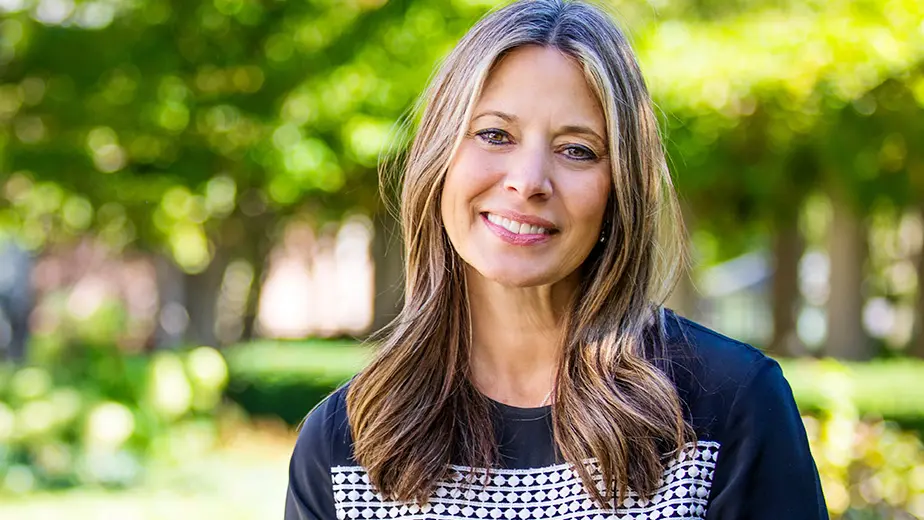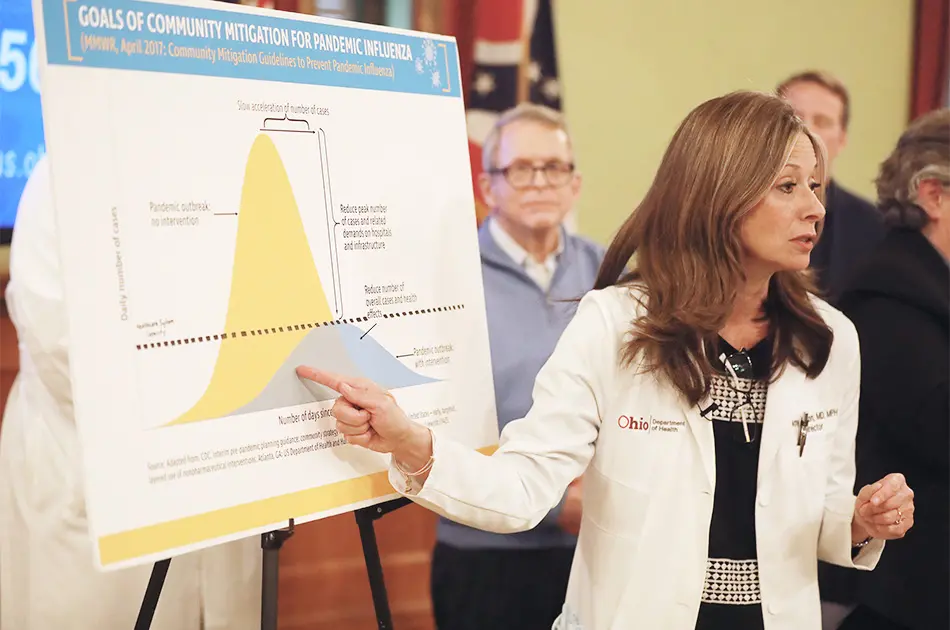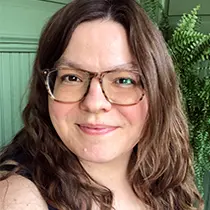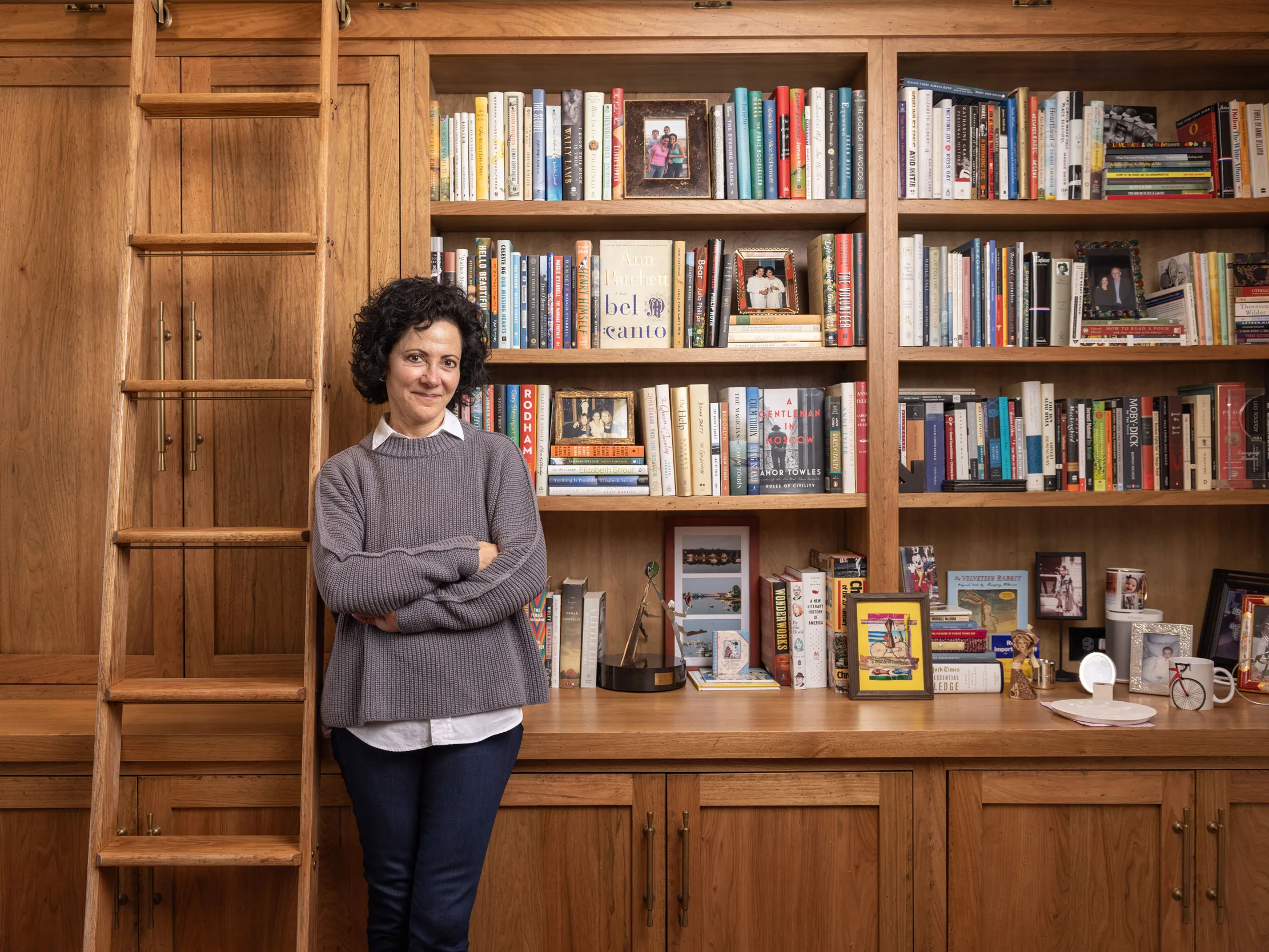There’s a remedy in kindness
Amy Acton ’96 MPH may have formally left her role as director of the Ohio Department of Health, but she doesn’t consider her work in keeping Ohioans safe in a pandemic to be finished. Far from it.

Dr. Amy Acton, the 2020 alumni medalist, runs the Kind Columbus initiative at The Columbus Foundation. She was director of the Ohio Department of Health during the first several months of the COVID-19 outbreak. Courtesy of The Columbus Foundation
Her new position as director of The Columbus Foundation’s Kind Columbus initiative dovetails perfectly with her continued advisory relationship with Ohio Gov. Mike DeWine. Avid watchers of the governor’s daily COVID-19 news conferences will remember Acton’s explanations of the Swiss cheese model, a safety approach that has applications in many situations, including this pandemic. Think of each tactic — handwashing, face masks, social distancing — as a slice of Swiss cheese. Each has its own “holes,” or imperfections, but overlap them and you get something pretty powerful.
Acton believes there’s one missing slice, something that should be intentionally built into future models, something we Americans desperately need to move forward: the work of kindness.
-
What are a few things that give you hope these days?
When you say hope, I feel the despair, and I see it in everyone around me. But I also have this inkling that there are blessings embedded in it. During one of the early press conferences, I said, about the pandemic, ‘It’s not shutting us down, it’s waking us up.’ I realized that within the chaos and all of the laying bare of what’s broken about us, what’s neglected in the world around us, lie the seeds for change.
I think there’s going to be a moment coming upon us very soon where it will hit people again. We’re going to move inward, it will get dark, the virus is spreading. There will come a moment when people will hit a peak of despair, and in that moment they’ll really need an antidote and leadership. In that, there’s a chance for a bipartisan way to move forward.
When we’re on the other side of this, there will have been four stages, in my opinion. There’s now — no one can hear anything right now. [This interview was conducted Oct. 22.] There are the two months post-election to New Year, a really important moment. And then there’s the vaccine and getting back out there, when we know how to live with the virus better than we did so we feel a little more confident. And then there’s ‘What’s next? How do we rebuild?’ And there’s a lot of hope in that.
-
Is this bipartisan work part of your new role with The Columbus Foundation or something different?
It’s both. It’s part of my role at the foundation as well as something separate. I’m still close to the governor and get a lot of calls now. I never stopped the work. I was not afraid, I didn’t go away. I just hit a wall where I was being weaponized against the good work that needed to be done. You realize when you reach a point where you can’t be heard, when you’re inadvertently being used as a lightning rod.
From the beginning I talked about the heroes — the nurses, the teachers. Everyone is going to have a role to play. And I think for me, my role, I’ve been talking with the people I originally worked with who invented the Swiss cheese model of non-pharmaceutical interventions. I feel like there’s one more layer we need in this country to go forward, and that should be intentionally built into all future work. And it’s about this work of kindness.
I worked at The Columbus Foundation before I took the director job, so I was already working on concepts with a colleague of mine on this idea of Columbus being a ‘blue zone.’ Blue zones are these places where people live longer and have happier, more productive lives. This has been studied for probably 50 years or more, and it’s really got a science base to it — as does kindness. So coming back to this was literally just going home.
My biggest fear about Kind Columbus was that it would be seen as fluffy. Kind of ‘be nice.’ And that’s not it. Kindness is a very ancient principle and value that a community adopts. Whether they recognize that they are adopting it or not, it’s biblical, even earlier than that. Most recently we saw it in John Lewis’ obituary that he wrote for The New York Times.
It’s an age-old wisdom that we have in humanity about seeing the other — the God in me greets the God in you — and just how profound a cultural value that is. Kindness talks about unity and human dignity and civility, which as we know are under threat right now. I said in my press conference remarks, ‘The contagion worse than the virus is fear and uncertainty.’ That was kind of an aha thing I discovered when researching all this. We were able to transcend that fear and uncertainty for a moment, we were able to throw lifelines to each other, and that’s exactly what we need again.
Kindness will help us get through the next phase. That’s what I’m interested in, and it’s the same thing I’ve done my whole life.
“In class, Dr. Acton would communicate to us the harsh realities of the world. But she did so in this way that had deep impact. You could just see how she cared to her core. She’s pure compassion.”
-
What do you hope to accomplish in your new role as director of Kind Columbus?
At its core, we’re hoping to spread a contagion of these ideas in a really science-based way. At The Columbus Foundation, we often have a really unique way to be neutral keepers in partnership with nonprofits and businesses and individuals. The definition of philanthropy is love of humankind. It’s about the love of humanity through generous acts.
We’re looking at a multipronged strategy, and some of these things already existed here. We have The Giving Store, where people can see all the nonprofits and things that exist in the community. Gifts of Kindness is another existing program, and this is a fund that helps nonprofits help somebody just make it through that rough spot. The thought behind this work is that everyone can make a difference. You could have $25 to donate and it could help pay someone’s car repair bill.
It’s really a way all of us can join together and make kindness a value for our community. Secretly I hope this becomes a shared collective value in the very fabric of our community. And there’s a lot of talk about how that spreads. The real hope is that kindness can spread and be contagious and be an antidote to hate and fear.
-
What’s one way people can spread words of kindness as part of their daily routine?
Start with yourself. What I’ve been thinking about lately is, how do people trigger themselves to think about kindness in ways big and small? Because we all get carried away in the events of the day, or we’re so buried ourselves — people are at home taking care of their kids and their work or their parent.
And I thought, putting on a face mask can be a moment where you think, ‘This is a kind thing we’re doing for ourselves, for our families and for each other.’ It can be that one fractional second where you wake yourself up from the stupors we all get in just trying to survive. And it’s a reminder to be kind in whatever presents itself in your day — it might be a friend who’s losing it or your kid having a temper tantrum. What’s the kindness you can find in that moment?
-
What’s one piece of advice you would give your 2019 self?
To trust my gut. We’re all carrying a lot of wisdom. Being vulnerable can be used against you, but there’s a lot in it that is worth taking the risk.

Dr. Amy Acton, during a daily news briefing while she was director of the Ohio Department of Health, explains how sound public health practices save lives. Doral Chenoweth III, courtesy of The Columbus Dispatch
-
Who are your heroes?
This whole journey is about discovering your unique strengths and using them. When you do that, you become a vital person. It spreads, and it makes other people vital around you. My wish is for people to find those things about themselves that they can give back to the world. Those are my heroes. They come in every shape and size, but you know it when you see someone who’s truly alive.
-
Do you have a guiding principle that you live by?
Not looking the other way in the face of suffering. There’s so much we can’t fix overnight, but for me it’s just about having the courage to be witness and be with, even when you can’t fix it.
I think we’re seeing a lot of this now in the face of a lot of the hate and loud voices. What I discovered during the pandemic was that 80 percent of us all want the same thing, and sometimes it’s scary to speak up and use your voice. But it’s so important to not look the other way. That’s what bullying is about — it’s about bystanders.
-
Can you share the impetus behind Ohio State’s Future Leaders of Public Health Scholarship Fund, created in your name?
It’s another one of those contagious things. There was a mom staying home during the pandemic, and her unique skills are around design. She and her son created “Act on Love Not Hate” yard signs. People from all over the state would ask for these signs, and anything extra after covering her costs she would set aside for this idea of starting a scholarship fund for the College of Public Health at Ohio State.
It’s a fund for people who have a story similar to mine. You know, I had a pretty rough childhood and beginning to my life. And there are many more of us. You know, two out of five children in Ohio are living in poverty and neglect. The scholarship fund will help people who, with their lived experiences, are so valuable. It’s a way to help those folks get into these fields where we need their insights to solve our biggest problems.
-
How did you feel when you found out you were being honored with the top award, the Alumni Medalist award, by the alumni association?
It was truly a surprise. So much about this has been an honor. It was an honor to get the unexpected phone call from a governor who I didn’t even know, and to learn he was very passionate about public health and people, and to leave my nice, comfy life that I know and take this leap. I’m truly just an ordinary person doing what I’m doing, and I found myself at this weird spot in history that no one could see. It really is an honor, and I’ll do my best to be worthy of that.
Empower future leaders
The Dr. Amy Acton Future Leaders of Public Health Scholarship will support the next generation of public health practitioners.



